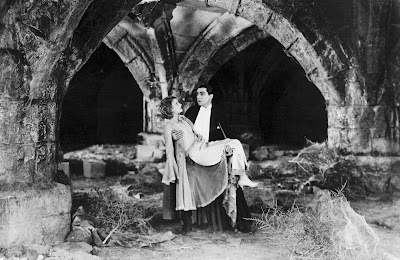Happy holidays to everyone!
Next up I'm doing live music for Chaplin's 'The Gold Rush' (1925) on New Year's Day (Jan. 1, 2024) at the Garden Cinemas in Greenfield, Mass.
Showtime is 6:30 p.m. Hope you'll join us for Chaplin's immortal comedy, set in the Klondike Gold Rush era. Lots more info is in the press release pasted in below.
For now in what I assume will be my final post of 2023, I'd like to thank everyone who attended or who otherwise supported my screenings in the past year.
I very much appreciate all the people, many unknown to me, who make it possible to continue to do live music for silent cinema a century after the format was reaching its peak.
They do that by buying tickets and attending screenings that I accompany. This is crucially important because without an audience, the experience doesn't work, either artistically or financially.
So thank you! Hope to see you all again in the new year—at least until the lights go down.
* * *
Chaplin consumes a shoe in a famous sequence from 'The Gold Rush' (1925).TUESDAY, DEC. 26, 2023 / FOR IMMEDIATE RELEASE
Contact Jeff Rapsis • (603) 236-9237 • jeffrapsis@gmail.com
Charlie Chaplin's 'The Gold Rush' in Greenfield, Mass. on Monday, Jan. 1
Family
fun: Little Tramp's silent film comedy classic
set in the frozen Arctic to be screened with live music on New Year's Day
GREENFIELD,
Mass. — Classic silent film comedy returns to the big screen on New
Year's Day with 'The Gold Rush' (1925), a classic comedy starring
Charlie
Chaplin.
The screening will take place on Monday, Jan. 1, 2024 at 6:30 p.m. at the Greenfield Garden Cinemas, 361 Main St., Greenfield.
The
screening will feature live accompaniment by Jeff Rapsis, a New
Hampshire-based composer who specializes in creating music for silent
films.
Admission is $10.50 adults, $8:50 for children, seniors, and students. Tickets are available online or at the door.
'The Gold Rush,' a
landmark comedy and one of the top-grossing films of the silent era,
finds Chaplin's iconic 'Little Tramp' character journeying to the frozen
wastelands of the Yukon. There as a prospector, the Tramp's search for
gold turns into a pursuit of romance, but with plenty of laughs along
the way.
The film contains several famous scenes, both comic and
dramatic, including a starving Chaplin forced to eat his shoe for
Thanksgiving dinner and a heart-breaking New Year's Eve celebration.
As
a comedian, Chaplin emerged as the first superstar in the early days of
cinema. From humble beginnings as a musical hall entertainer in
England, he came to Hollywood and used his talents to quickly rise to
the pinnacle of stardom in the then-new medium of motion pictures. His
popularity never waned, and his image remains recognized around the
world to this day.
'The Gold Rush,' regarded by many critics as
Chaplin's best film, is a prime example of his unique talent for
combining slapstick comedy and intense dramatic emotion.
" 'The Gold Rush' is still an effective tear-jerker," wrote critic Eric Kohn of indieWIRE. "In the YouTube era, audiences — myself included — often anoint the latest sneezing panda phenomenon as comedic gold. Unless I’m missing something, however, nothing online has come close to matching the mixture of affectionate fragility and seamless comedic inspiration perfected by the Tramp."
Rapsis, who uses original themes to improvise silent film scores, said the best silent film comedies often used visual humor to create laughter out of simple situations. Because of this, audiences continue to respond to them in the 21st century, especially if they're presented as intended — with an audience and live music.
"These comedies were created to be shown on the big screen as a communal experience," Rapsis said. "With an audience and live music, they still come to life as their creators intended them to. So this screening is a great chance to experience films that first caused people to fall in love with the movies," he said.
• Monday, Feb. 5 at 6:30 p.m.: 'Flesh and the Devil' (1926). Just in time for Valentine's Day! Garbo and Gilbert steam up the camera lens in this torrid romance set in 19th century European high society.
• Monday, March 4 at 6:30 p.m.: 'The Passion of Joan of Arc' (1928). Danish director Carl Dreyer's intense recreation of the trial of Joan of Arc set new standards for cinematography and expanded the language of film in new directions.
• Monday, April 1 at 6:30 p.m.: 'Safety Last' (1923). The iconic image of Harold Lloyd dangling from the hands of a downtown clock is just one scene of a remarkable thrill comedy that has lost none of its power over audiences.









































